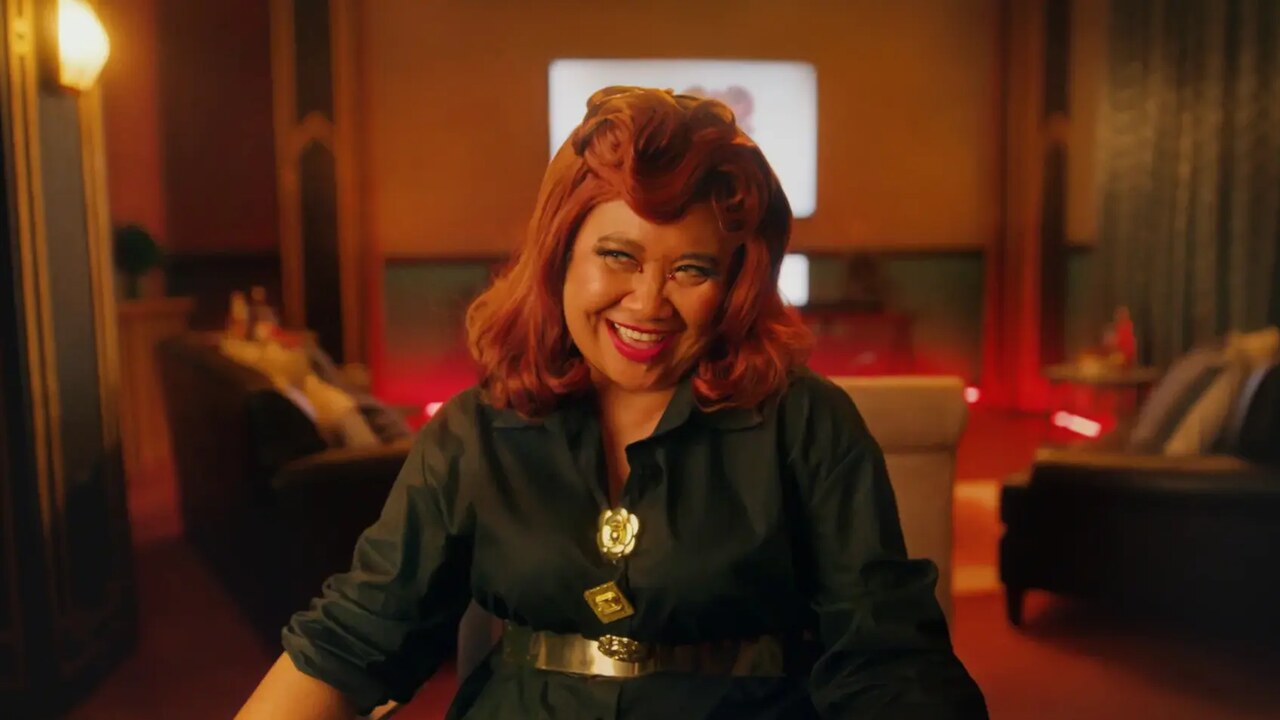
I walked into Kontrabida Academy expecting camp, soap-opera clichés, and maybe a few laughs at over-the-top villainy. What I got was a mess that mostly works, with enough flair and heart to make it worth your time, though not without some obvious cracks in its foundation.
First, let me praise what the film does right: there is something delicious about seeing the kontrabida, the villainess, being given center stage as more than just the foil to a heroine. Gigi (Barbie Forteza) is set up in a life full of travail: bad days at work, familial pressure, heartbreak, and disrespect. The movie doesn’t shy away from letting you feel how worn-out she is. When that TV portal drags her into this academy, it doesn’t feel like goofy fantasy alone; there’s something cathartic in the idea of training to fight back, in caricature, but still with intention.
Eugene Domingo as Mauricia is a delight. She owns the role of headmistress with the kind of camp power that can both mock and elevate the melodramatic tradition. Her mentorship is playful but sharp; she’s part drill sergeant, part diva, and fully committed to the bizarre curriculum: entrance walks, monologue sharpening, dramatic slaps. Watching her coach, Gigi is the highlight: the chemistry between Domingo and Forteza gives energy and tension. The worldbuilding of the academy, its classrooms, and its rituals of contrariness is vivid. It leans into color, exaggeration, and spectacle, but in a way that mostly enhances rather than distracts.
There are sparkling moments of wit, of social commentary hidden beneath the glitter. The film knows what it’s doing when it mines the kontrabida trope, the idea that sometimes the villain is villain because the world demands it. After all, it’s better to be feared than ignored. Those themes of empowerment through embracing parts of yourself that others deride are handled with warmth. Visually, there are fun touches: the over-the-top glamour of villainy, the absurdity of teleserye tropes played literally, the contrast between Gigi’s downtrodden real world and the academy’s heightened unreal one.
But—and here come the caveats—Kontrabida Academy doesn’t always stick its landing. For every inspired scene of exaggeration or ironic twist, others feel padded, derivative, or emotionally thin. I found that some characters beyond Gigi and Mauricia are underwritten. Rivalries and side plots are introduced, but the film doesn’t always follow through on them; you sense potential that isn’t fully realized.
Pacing is mixed. Since the movie tries to balance between comedy, drama, fantasy, and metaphor, it sometimes drifts. Midway, there are sequences that seem to slow you down, not in a contemplative way but in a “let’s add more slap lessons” way. The emotional arcs occasionally get messy: Gigi’s transformation toward her kontrabida self isn't always matched by internal stakes; sometimes the film wants us to feel better simply because she’s standing up, but the cost of that doesn’t always land.
Also, there are clichés it leans on too heavily. Some melodramatic confrontations feel too familiar; the “villain laugher” trope, the over-dramatic wardrobe changes, the family drama — these have been done before, especially in Filipino soap-opera infused cinema. It’s hard to fault the film for embracing tradition, but it sometimes falls into the trap of echoing what it’s criticizing. In places, it feels more parody than innovation. That’s fun, but by the end, you want it to push harder beyond parody to surprise you in its villainy, not just poke fun at it.
Yet despite these flaws, Kontrabida Academy almost always redeems itself in sheer entertainment. There are moments where I laughed out loud, where I sat up in my seat wishing I too could practice a villainous entrance or sharpen my villain tongue. The movie doesn’t pretend to be darker than it is; it knows it’s playing in melodrama, and it plays hard. And that makes many scenes succeed just because they commit.
If I had to grade it, I’d say the film is more successful at being a playful romp than a deep psychological or moral examination. The empowerment message is there, but it is thinner than it might want to be. Some supporting arcs (romance, family, rivalry) are more scaffolding than flesh. And while the fantasy-school premise is appealing, the rules of that world, what being a kontrabida really means, beyond dramatic gestures, sometimes feel vague.
Overall, Kontrabida Academy is a film with attitude. It’s flamboyant, funny, and often touching. It is most compelling when it leans into what makes the kontrabida iconic: audacity, spectacle, refusal to stay small. It’s less compelling when it circles back to safety, when it reverts to a trope without twisting it.
If you're in the mood for something dramatic but not too heavy, something very Filipino in its tone, something that lets you root for the villain, this film is for you. It won’t reinvent the genre, but it gives kontrabidas their due, and it does so with enough sass, enough heart, and enough sharpness to make the ride worthwhile.
Final Score- [6/10]
Reviewed by - Anjali Sharma
Follow @AnjaliS54769166 on Twitter
Publisher at Midgard Times
Get all latest content delivered to your email a few times a month.
Bringing Pop Culture News from Every Realm, Get All the Latest Movie, TV News, Reviews & Trailers
Got Any questions? Drop an email to [email protected]